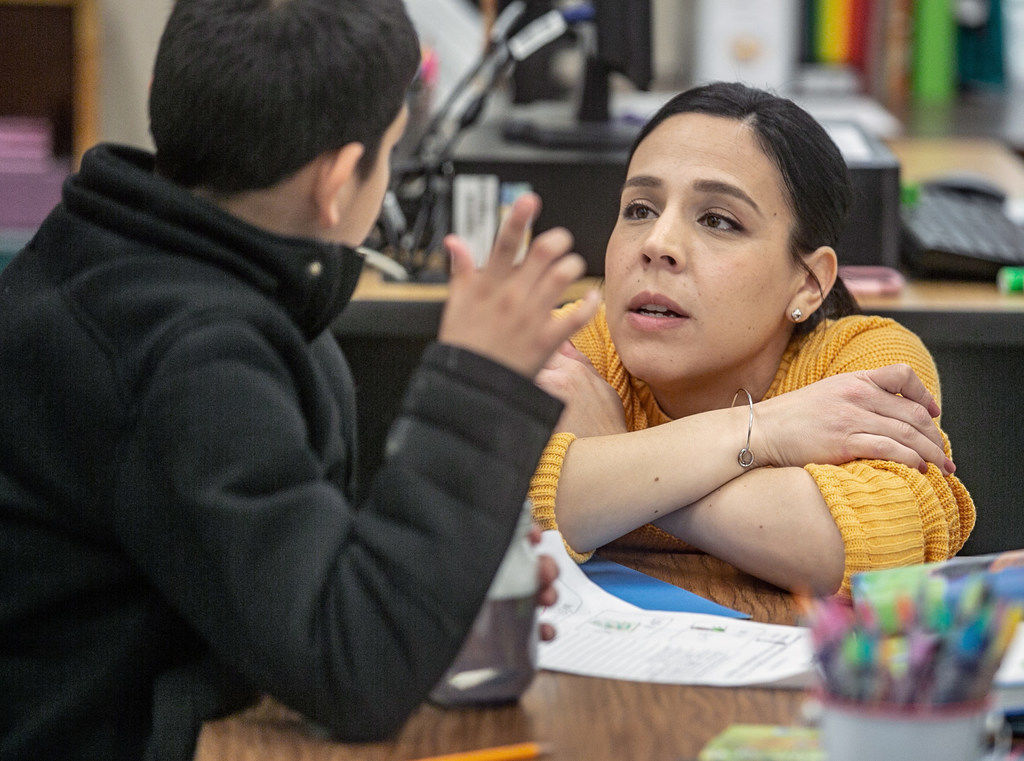In Miriam Romero’s classroom at Carrillo K-5 Magnet School, nearly all her students are immigrants. Most are Mexican-born, but increasingly there are more from Central America.
In each of them she sees a dignified young person with an individual story representing a culture, history and the struggle that the student and their family underwent to arrive in Tucson to begin a new journey.
As she scans her English-language-learning classroom, active with the students buzzing and whispering and doing, she often reminds herself of the enduring lesson that her maternal grandparents taught her: “The end result of wisdom is … good deeds.”
It comes from the Talmud, she said. Her maternal grandparents lived in Brooklyn, children of Russian Jewish immigrants whom she and her sister often visited during the summers away from Tucson and her Mexican family. “If you know something,” she paraphrased her grandparents’ lesson, “it should lead to good deeds.”
One result of her good deeds, which stems from her knowledge, is that Romero, 35, was honored early this month as the 2018 Arizona English Language Learner Teacher of the Year in a ceremony at JW Marriott Starr Pass Resort. Arizona Superintendent of Public Instruction Diane Douglas presented Romero with the award.
At the same ceremony, Palo Verde High School student Houda Makansi, a Syrian refugee, was one of four Arizona students who received the Arizona English Language Learner Success Story award from the Arizona Department of Education’s Office of English Language Acquisition Services.
Romero’s pedagogical mantra forms the core of her teaching philosophy, which has moored her for the past 12 years in the Tucson Unified School District. Eleven of those years have been at Carrillo in Barrio El Hoyo, where Romero went as a child and two of her four children are students.

Miriam Romero, with fourth-grader Analiyah Montoya Lerma, was honored as the 2018 Arizona English Language Learner Teacher of the Year.
Adding to her core beliefs are the influences from her parents, Stephen Gomez and Amy Feldman, both retired educators; her husband, Carlos Romero, coordinator of the Upward Bound program at Pima Community College; and other educators who mentored her along the way, including Curtis Acosta, a former teacher in the state-banned Mexican American Studies program at TUSD and currently a consultant and program director in Language and Culture in Education at University of Arizona South in Sierra Vista.
From them, Romero has focused on her students, academically and culturally, as both go hand in hand. It’s important that the students’ cultures are represented in a positive light as they attain their education, said Romero, a graduate of University High School.
Since she was a student at the University of Arizona, where she earned dual degrees in bilingual education and Spanish and Portuguese literature, she had the yearning to become an educator as a way of contributing to her community. By working with students and their families, she understood she could be connected and grounded to the Latino community.
But politics intruded and nearly sidetracked Romero.
By her final year at the UA, the Republican-dominated state government had banned bilingual education in public schools largely on ideological grounds despite ample evidence that it had been proven successful. In her first year of teaching at Tolson Elementary School on the west side, there was widespread confusion how to teach English learners in the absence of bilingual-education programs.
Students who did not speak English at home were segregated under new state mandates. Their home languages and cultures were diminished. Romero could see in her students a change, not necessarily for the better. The first-year teacher was dispirited and left the classroom to be a school librarian .

Miriam Romero was honored early this month as the 2018 Arizona English Language Learner (EL) Teacher of the Year. While Romero is proud of her award, she says the recognition does not validate her classroom work. Her students’ success and their families support validated her work, she adds.
While that was rewarding, Romero missed the unique interaction with students that occurs in the classroom. When a job opened at Carrillo, Romero jumped at the chance to work in the ethnically diverse, historic school.
She returned to the classroom with renewed vigor and a new teaching tool — Mexican-American Studies. While the Republican state government had banned that as well, Romero nonetheless began to incorporate key MAS elements into her teaching. Radical stuff like acquiring precious knowledge, self-reflection, transformation into a better person and taking positive action.
Romero feels “spoiled” by her students at Carrillo and their supportive families.
“The kids have an intrinsic motivation to learn, to do well, to do something for their community,” she said. In turn, that drives her to be the best teacher she possibly can be.
While Romero is clearly proud of her award, she said the recognition does not validate her classroom work. Her students’ success and their families’ support do that, she said.
“I already felt successful,” she said. “This is validation not for me, but my kids.”







